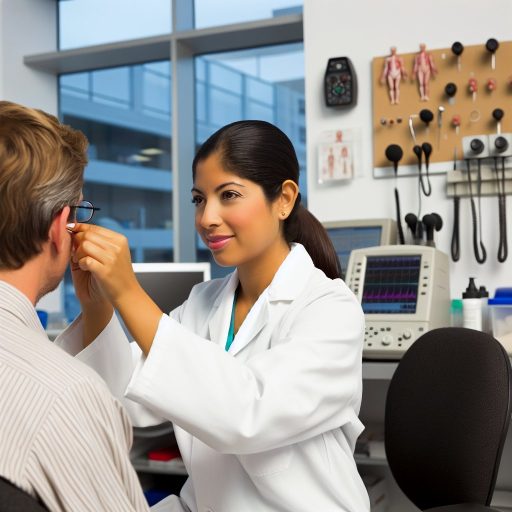Understanding the Role of a Speech-Language Pathologist
Core Responsibilities
A speech-language pathologist, or SLP, plays a vital role in communication health.
They assess, diagnose, and treat speech and language disorders.
This includes difficulties with articulation, fluency, voice, and language processing.
Additionally, they address swallowing difficulties in various populations.
Work Settings
Speech-language pathologists work in diverse environments.
They can be found in schools, hospitals, and rehabilitation centers.
Many SLPs also operate private practices or participate in research.
Some provide services in clients’ homes or community settings.
Collaboration with Other Professionals
SLPs often collaborate with educators, physicians, and occupational therapists.
This teamwork helps create comprehensive treatment plans for clients.
Communication with families is essential for successful outcomes.
Moreover, they advocate for clients’ needs across various disciplines.
Importance of Continuing Education
Continual learning is crucial in the field of speech-language pathology.
SLPs must stay updated on the latest research and treatment techniques.
Participation in workshops and conferences enhances their skills.
Additionally, getting certified in specialized areas can benefit their practice.
Educational Requirements and Degree Programs
Overview of Degree Programs
A career in speech-language pathology starts with appropriate education.
Students typically pursue a master’s degree in speech-language pathology.
Many universities offer specific programs for this field.
Look for accredited programs that meet licensure requirements.
Online programs are increasingly available and effective.
Undergraduate Studies
Students generally begin with an undergraduate degree in communication sciences.
This foundational study covers essential topics related to speech and language.
Courses often include linguistics, psychology, and anatomy.
Many students choose to volunteer to gain practical experience.
Unlock Your Career Potential
Visualize a clear path to success with our tailored Career Consulting service. Personalized insights in just 1-3 days.
Get StartedSuch experience can enhance understanding and application of theoretical concepts.
Graduate Studies
After completing an undergraduate degree, students pursue a master’s program.
Graduate programs delve deeper into speech and language disorders.
Students engage in both coursework and clinical practice during this phase.
Internships provide key hands-on experience in various settings.
Graduates must complete a specific number of supervised clinical hours.
Certification and Licensure
After earning a master’s degree, professionals must obtain certification.
The Certificate of Clinical Competence in Speech-Language Pathology is essential.
This certification requires passing a national examination.
In addition, each state has its own licensure requirements.
It’s important to check specific state regulations to ensure compliance.
Continuing Education
Speech-language pathologists benefit from ongoing education throughout their careers.
Continuing education helps professionals stay updated on best practices.
Many states require a certain number of continuing education hours for renewal.
Attending workshops and conferences also offers networking opportunities.
This ongoing learning enhances skills and improves service to clients.
Gaining Relevant Experience through Internships and Volunteer Work
The Importance of Hands-On Experience
Gaining hands-on experience is essential in speech-language pathology.
Practical experience enhances your understanding of theoretical concepts.
Furthermore, it provides opportunities to apply what you’ve learned in real-world settings.
Finding Internships
Begin your search for internships early in your academic journey.
Many universities offer internship placement services.
Check with your academic advisor for potential opportunities.
Networking with professionals in the field can also open doors.
Reach out to local clinics, schools, and rehabilitation centers for openings.
Exploring Volunteer Opportunities
Volunteering is another excellent way to gain relevant experience.
Look for organizations that serve individuals with communication disorders.
Volunteer roles can help you build connections within the industry.
Moreover, they allow you to practice skills in less formal environments.
Making the Most of Your Experience
Once you secure an internship or volunteer position, be proactive.
Ask questions and seek feedback from supervisors and colleagues.
Engaging with clients and professionals enhances your skillset.
Document your experiences and reflect on what you have learned.
Building a Professional Network
Networking is crucial for advancing your career in speech-language pathology.
Attend workshops, conferences, and meetups related to communication disorders.
Connect with peers and established professionals on social media platforms.
Maintaining these relationships can lead to mentorship opportunities.
You Might Also Like: Speech Pathology Services Covered In Canadian Healthcare
Obtaining Licensure and Certifications
Understanding the Requirements
Licensure requirements vary by state and territory.
Speech-language pathologists must earn a master’s degree in speech-language pathology.
Additionally, completing a supervised clinical fellowship is mandatory.
Each aspiring professional should research their specific state requirements.
National Certification
The American Speech-Language-Hearing Association (ASHA) offers national certification.
Obtaining the Certificate of Clinical Competence (CCC) is crucial.
To achieve this, graduates must pass a national examination.
Moreover, they must complete specific clinical hours.
Applying for State Licensure
After meeting educational and certification requirements, apply for state licensure.
Each state has its application process and fees.
Many require proof of national certification from ASHA.
In some instances, continuing education credits are necessary.
Staying Compliant
Maintaining licensure requires ongoing education or professional development.
Most states mandate a set number of continuing education units (CEUs).
Professionals should stay updated on the latest research and practices.
Joining professional organizations can help with networking and learning opportunities.
Specialty Certifications
Consider further specialization through additional certifications.
These may include areas like pediatric speech-language pathology or swallowing disorders.
Specialty certifications can enhance career prospects and expertise.
Research the requirements for each certification to plan accordingly.
Find Out More: How Chiropractic Adjustments Improve Spinal Health
Specializing in Areas of Interest within Speech-Language Pathology
Identifying Your Passion
Select an area that excites you most.
Consider interests in language disorders, speech fluency, or swallowing issues.
Reflect on any personal experiences that shaped your focus.
Exploring Diverse Specializations
Speech-language pathology offers numerous specializations.
Areas include pediatric speech, adult rehabilitation, and fluency disorders.
You might also explore voice therapy, aphasia treatment, or dysphagia management.
Gaining Relevant Experience
Seek internships in varied settings for hands-on exposure.
Consider clinics, schools, or rehabilitation centers for diverse experiences.
Network with professionals for guidance and mentorship opportunities.
Continuing Education and Certification
Pursue additional certifications in your specialization.
Join workshops or conferences to enhance your knowledge.
Stay updated on the latest research and techniques in the field.
Joining Professional Organizations
Become a member of reputable organizations like ASHA.
These groups offer resources, networking, and advocacy opportunities.
Participate in forums to connect with peers and share best practices.
Building a Professional Reputation
Showcase your expertise through presentations and publications.
Consider participating in speaking engagements or workshops.
Establish an online presence to share insights and tips.
Gain More Insights: Career Opportunities for Kinesiology Graduates in Canada

Networking and Professional Associations in Speech-Language Pathology
The Importance of Networking
Networking plays a crucial role in building a successful career in speech-language pathology.
It allows professionals to connect and share knowledge and resources.
Additionally, networking opens doors to mentorship opportunities.
Attending conferences can enhance your understanding of industry trends.
These events also provide chances to meet potential employers.
Ultimately, networking can lead to job referrals and collaborations.
Joining Professional Associations
Professional associations offer a wealth of resources for speech-language pathologists.
Membership often includes subscriptions to academic journals and newsletters.
These organizations regularly host workshops and training sessions.
Involvement in an association can expand your professional network significantly.
Examples include the American Speech-Language-Hearing Association (ASHA).
Another noteworthy organization is the National Association of Deaf Educators (NADE).
Utilizing Social Media for Networking
Social media platforms have become essential tools for networking today.
LinkedIn is particularly beneficial for connecting with professionals in the field.
You can join specific groups related to speech-language pathology.
Twitter can also be a source for following industry leaders and discussions.
Engaging in online forums allows for knowledge exchange and support.
Online networking can lead to opportunities that might not be visible otherwise.
Volunteering and Community Involvement
Volunteering is an excellent way to build connections in your community.
Service opportunities can enhance your skills while making a difference.
Consider working with local schools or health clinics.
Such experiences can also enrich your resume significantly.
Through volunteering, you might meet other professionals in dynamic settings.
These connections can lead to future job opportunities or collaborations.
Leveraging Alumni Networks
Your university alumni network can be a valuable resource.
Many alumni are willing to help recent graduates with job searches.
Attend alumni events to connect with others in your field.
These interactions can provide insider knowledge on job openings.
Additionally, alumni can offer career advice and mentorship.
Establishing these relationships can benefit your career long-term.
Explore Further: How to Become a Licensed Kinesiologist in Canada
Continuing Education and Keeping Skills Updated
The Importance of Lifelong Learning
Lifelong learning is essential in speech-language pathology.
This field evolves regularly due to research advancements.
Additionally, new therapies and techniques emerge constantly.
As a result, staying current enhances professional effectiveness.
Accredited Continuing Education Programs
Accredited programs provide reliable resources for skill enhancement.
Check organizations like the American Speech-Language-Hearing Association (ASHA).
These offer workshops, webinars, and conferences throughout the year.
Engagement in these opportunities fosters professional development.
Online Learning Platforms
Many online platforms offer flexible learning alternatives.
Consider resources like SpeechPathology.com and MedBridge.
These platforms provide various courses covering diverse topics.
Additionally, they allow you to learn at your own pace.
Networking and Professional Associations
Networking plays a vital role in keeping skills updated.
Join local and national speech-language pathology associations.
Attending conferences helps build valuable professional connections.
These connections can lead to collaboration and knowledge sharing.
Staying Current with Research
Read peer-reviewed journals in speech-language pathology consistently.
Publications like the Journal of Speech, Language, and Hearing Research offer insights.
Understanding current research helps you apply evidence-based practices.
Regular reading cultivates critical thinking and innovation.
Participating in Workshops and Seminars
Workshops and seminars offer hands-on learning experiences.
These events encourage skill practice under expert guidance.
Participating can enhance both theoretical knowledge and practical skills.
Check local universities or professional organizations for upcoming events.
Exploring Job Opportunities in Various Settings
Working in Schools
Schools provide diverse opportunities for speech-language pathologists.
They help students with speech and language challenges.
Pathologists collaborate with teachers and parents.
They develop individualized education programs (IEPs).
Additionally, schools often offer ongoing professional development.
Opportunities in Hospitals
Hospitals present unique career paths for speech-language pathologists.
They work with patients recovering from strokes or surgeries.
Team collaboration with doctors and nurses is essential.
Moreover, pathologists engage in evaluations and treatment plans.
They often focus on critical communication and swallowing issues.
Private Practice Potential
Private practice offers flexibility and autonomy for speech-language pathologists.
In this setting, pathologists cater to diverse client needs.
They can specialize in various disorders such as stuttering or articulation.
Marketing their services and networking is crucial for success.
Furthermore, private practice allows for a personalized approach to therapy.
Telepractice Opportunities
Telepractice is an emerging field in speech-language pathology.
It offers services through virtual platforms, expanding access to clients.
Pathologists can reach individuals in remote areas.
This innovative approach also provides scheduling flexibility.
Additionally, technology plays a significant role in delivering effective therapy.




